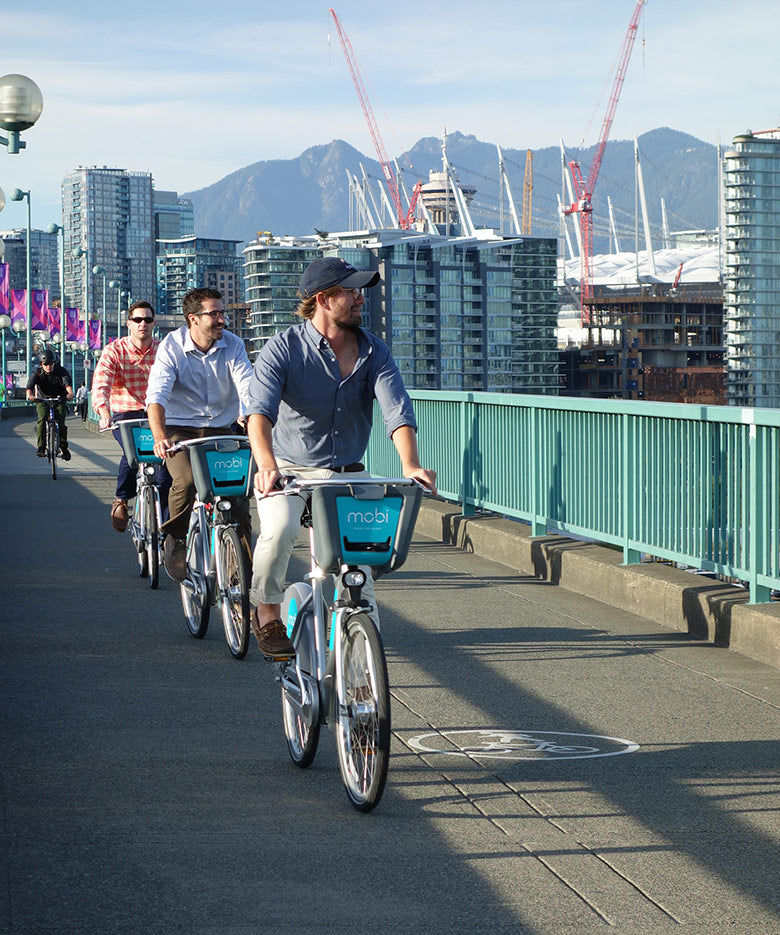Every 2 years, transportation planners and engineers, bicycle advocates, and city bike-ped officials come together at the ProWalk ProBike ProPlace conference. It provides the opportunity for cities to promote their accomplishments, share new ideas, learn best practices, network with peers, and generally get inspired by all the great work being done across North America. This year's conference in Vancouver certainly did not disappoint. 
Test-riding Vancouver's new bike share.
It was incredible to see all that has been accomplished since the previous conference in Pittsburgh in 2014. Cities large and small are embracing multi-modal support through infrastructure in ways that were unthinkable just 10 years ago. From protected bike lanes and intersections, to bike-share, greenways, and place-making, cities are raising the bar on successful projects that are meeting the changing transportation needs and demographics of our communities. And Vancouver is the perfect city for showing what great bike-pedestrian infrastructure can look like.
A two-way protected bike lane along Hornby Street, Vancouver.
Four years ago the most popular topic at the event was protected bike lanes: why they are important, the need to standardize design, and how to build consensus among city stakeholders to build them. Now, it's become required infrastructure in many communities, the National Association of City Transportation Officials (NACTO) has published an official design guide, and city officials are boasting over how many miles of protected bike lanes they've built. It's amazing how far we've come.
Wall-to-wall attendance for "The Next 5 Years" presentation.
An indication of this is the popularity of sessions at this year's conference about the concepts of "Pop-up" infrastructure and Lighter, Quicker, Cheaper (LQC*). The philosophy is about rapid implementation, neighborhood-centered street redesign projects that are short-term, low-cost, and community-engaging. It allows planners to create temporary spaces that are more vibrant, adaptable, and multi-modal without the normal bureaucratic and budgetary restrictions. These projects create a test-lab of new design concepts and ideas that can positively affect safety, transportation mode-share, and neighborhood vibrancy. Projects in St. Louis and Seattle are great examples, and just two of the many that were inspirational to those in attendance. 
Our booth at ProWalk ProBike and ProPlace 2016, Vancouver, BC, Canada.
Saris has been involved with ProWalk ProBike ProPlace for over a decade. We've worn the hat of a sponsor, exhibitor, presenter, and host. In addition to catching up with old friends and meeting new ones, hanging out in our booth presents us a unique opportunity to do product research. Listening to the planners, implementers, and designers of our city streets and public spaces allows us to make sure our current and future products meet their needs. It gives us the ability to float new product features and ideas, and receive feedback on what tools/products they wished they had. As a product manager, these interactions are invaluable in ensuring Saris keeps the title as the leader in innovative and supportive products for those on the front lines of walking and biking advocacy and infrastructure. The delegates to ProWalk ProBike ProPlace are truly the change-agents for better cities and communities, and we want to assist them in any way we can.
Thanks to all those who stopped by, and see you in New Orleans 2018!
*For additional information on LQC, visit our friends at the Project for Public Spaces:
http://www.pps.org/reference/lighter-quicker-cheaper
